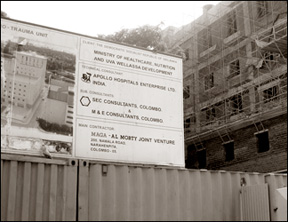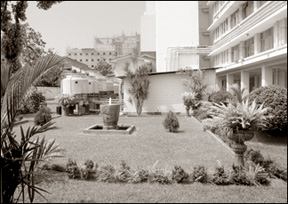Growth of the National Hospital-a pride to Sri Lanka
Changing the image of government hospitals:
by Rosanne Koelmeyer Anderson
"Growing from strength to strength, it is Sri Lanka's mentor in the
health sector and may be the largest Teaching Hospital in the world.
 From its humble beginnings at Hospital Street Fort, established way
back in 1861 with a bed strength of only 100, now relocated on a 32 acre
plot of land at Town Hall extending to the perimeters of Kynsey Road,
Regent Street and Ward Place, Colombo to a bed strength of 3000; the
National Hospital, Sri Lanka's momentous trace certainly puts Sri Lanka
on the map of success in medical accomplishment and advancement," Dr.
Hector Weerasinghe, Director, National Hospital Sri Lanka explained in
an interview with the Sunday Observer. From its humble beginnings at Hospital Street Fort, established way
back in 1861 with a bed strength of only 100, now relocated on a 32 acre
plot of land at Town Hall extending to the perimeters of Kynsey Road,
Regent Street and Ward Place, Colombo to a bed strength of 3000; the
National Hospital, Sri Lanka's momentous trace certainly puts Sri Lanka
on the map of success in medical accomplishment and advancement," Dr.
Hector Weerasinghe, Director, National Hospital Sri Lanka explained in
an interview with the Sunday Observer.
"Deviating for a moment from medical jargon and statistics, in reply
to my comment on the beautification and tastefully landscaped
surrounding of the hospital which I observed on entering, a face lift in
the making of a patient-friendly environment, a new concept as good as
any of the private hospitals in Colombo; Dr. Weerasinghe explained that
this was one aspect he had really concentrated on.
He had embarked on a beautification and landscape project, with the
assistance of the Hospital Committee which is being professionally done
and expected to be completed within the next two months being a Rs. 3.5
m donation for landscaping. "You will not get lost in this vast entity
any longer.
The hospital has been divided into colour zones and sign boards will
be displayed at the entrance giving the layout of that area. First
impressions count a lot. Psychologically, a beautiful surrounding I
believe attributes to almost fifty per cent cure and that was one reason
why many opted to go to private hospitals in the past, but now the
scenario is different, the National Hospital is being patronized by even
the elite.
Moreover, the hospital with its new appeal is geared to treat its
citizens of any illness cost free, a feature unique to Sri Lanka."
"Credit should go to the Minister of HealthCare and Nutrition, Nimal
Siripala de Silva who during his tenure has contributed a lot towards
the public health sector on the whole and posting all expertise
especially in the peripheral and increasing the cadre of medical staff
all round, from the para medics and MLTs to the attendants and minor
staff which has proven the public health sector's medical competence
overall".
 "The National Hospital, Sri Lanka (which was earlier known as the
General Hospital, Colombo and later made National Hospital, Sri Lanka in
1996 by Cabinet Decision) is a fully fledged Hospital with 18 Intensive
Care Units (ICUs) recorded a 2 million out patient treatment last year
of which 3000 came back to the follow up clinics, the neuro surgical,
medical, diabetes, orthopaedic etc. "The National Hospital, Sri Lanka (which was earlier known as the
General Hospital, Colombo and later made National Hospital, Sri Lanka in
1996 by Cabinet Decision) is a fully fledged Hospital with 18 Intensive
Care Units (ICUs) recorded a 2 million out patient treatment last year
of which 3000 came back to the follow up clinics, the neuro surgical,
medical, diabetes, orthopaedic etc.
The National Hospital records approximately 600 in patients a day
while last years figures recorded a total of 250,000 in patients on an
average length of stay of 5-6 days while the number of operations
performed last year amounted to 75,000 of which 1100 were open heart
surgeries, and 350 by pass surgeries, the highest number any hospital
has ever done.
The target having exceeded by 10. A recent introduction is the Cardio
Unit, a section where interventional cardiological procedures amounting
to 350-400 are conducted by surgeons relieving patients of going into
surgery immediately. However, the frequently asked question is why then
the long waiting list for heart surgery.
Data shows that around 2,000 people are born with congenital heart
disease per year and procedures have to be cleared in addition to other
patients who develop situations subsequently. Nevertheless, operations
for a day in the 28 operating theatres amount to 200-300 while the
occupancy is about 200-300 per cent in certain wards," Dr. Weerasinghe
further explained.
"Of the large number of patients referred the main cause of death in
trauma recorded has been due to head injury. In the wake of this
situation the director has embarked on a yet another state-of-the-art
unit, a centre of excellence in Neuro Surgery, a 300 bed Neuro Trauma
Unit with an ICU and operating facilities which is expected to be
commissioned in June next year being a loan of $15m from Saudi Fund for
development (SFD).
Presently there are two Neuro Surgical Units but these operations are
very time consuming and sometimes takes around 10-12 hours per surgery.
The Path Lab's significant contribution is also very commendable.
Last year, it has performed over 2m lab test, done over 40,000 CT
scan and 4,000 MRI scans investigations while there are four orthopaedic
teams with their supportive service to treat around 600 patients at a
given time.
A new project with 400 bed Medical Unit, well landscaped, is also in
progress as the building in which it is housed is very old and
dilapidated. The hospital also requires a new Theatre Complex and
Surgical Ward Complex in the near future," he added.
Incidentally, the number of female patients have increased over the
years which has compelled the government to allocate equal number of
beds for men and women at a cost of Rs. 400 m Dr. Weerasinghe added.
Meanwhile, construction on the new OPD Complex will be commence next
year.
One of the most important services rendered by the National Hospital
is of course the excellent Accident Service (the first in the country
which was established in 1965 while the new Accident Service moved in
1990, a donation of the building and equipment from Finland), the prime
unit of the hospital treating armed forces and civilians alike.
From trauma victims as a result of sports injuries to injuries due to
violence, 80-100 patients are admitted to the Accident Service daily.
Having served as Officer-in Charge of the Accident Service for a
decade prior to his appointment as Director, National Hospital, Colombo
where he has served for the past seven years, Dr. Weerasinghe is
resolute of making the National Hospital Sri Lanka, the largest Teaching
Hospital of international repute with state-of-the art technology.
[email protected]
|
